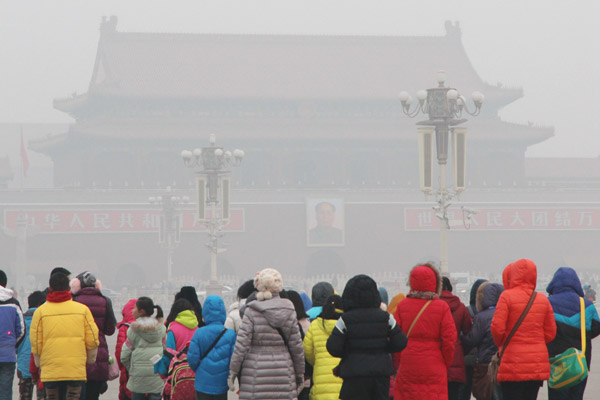What China is doing to clear the air
- By Feng Zhaokui
 0 Comment(s)
0 Comment(s) Print
Print E-mail China.org.cn, September 12, 2014
E-mail China.org.cn, September 12, 2014
|
Tourists at the Tian'anmen Square in a hazy day in January, 2014. [Photo: China Daily] |
The Nikkei recently published a report on China's environmental pollution on August 4th, and I was shocked and dumbfounded by the sensational headline – China, A Perishing Nation Amid Environmental Pollution – written with an intention to grab readers' attention.
It is true that environmental pollution and food safety have become serious problems in China. China is now the second-largest economy in the world and its military power is also growing, but a list of worrisome issues is also getting longer, such as corruption cases, widening gap between the rich and the poor and the much-to-be-desired national quality, with environmental pollution staying on the top of the list. Some in China now seem to believe that "China has become powerful enough," but in my opinion, China is actually a country with both strength and weaknesses, and one weak aspect is the environment. It is no exaggeration to say that China is an "environmentally weak country."
"Environmentally weak country" may mean that China's ecological environment has become fragile and the environmental issue is "weakening" China.
First, environmental pollution is "weakening" the health of the people. According to the World Health Organization, the number of cancer patients and deaths because of lungs, stomach, liver and esophagus diseases accounted for 30%, 40%, 50% and 50% of the global total, respectively. One culprit behind the figures is reportedly the deteriorating air and water pollution.
Second, environmental pollution is "weakening and undermining" China's prowess in science, technology and wealth. Some people have reportedly emigrated or are considering moving to foreign countries due to environmental pollution, food safety and their children's education. The talent outflows will lead to immeasurable losses to China's development of science and technology. The Hurun Report issued at the end of 2013 described the immigration waves in the past few years as "the third immigration exodus in China's modern history," and pointed out that "the rich and the elites with higher education constitute the mainstream of the emigrants."
Third, environmental pollution is "weakening and undermining" China's economy. According to an authoritative estimate made by the World Bank, the Chinese Academy of Sciences and the State Environmental Protection Administration in March 2007, the annual losses caused by environmental pollution amounted to about 10% of total GDP.
The good news is that the Chinese government is on high alert of the issues and has made environmental protection one of its top priorities and taken concerted actions to seriously address it.
China cannot afford to become an "environmentally weak country," nor could it take the so-called road of "destruction amid environmental pollution." Instead, China has charted an ambitious plan for environmental protection, with an aim of bringing the blue sky and white clouds back to the country, and given special attention to environmental protection in the construction of a modern, prosperous and rich socialist country.






